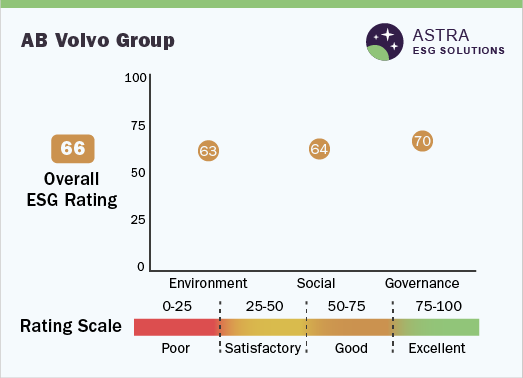Environmental, Social, and Governance (ESG) at AB Volvo
The policies that impact the environment, social, and governance, which are made by companies, involving consumers and the government, is shaping the current trend in investments in an unprecedented manner.
Being a key leader in the automotive industry, AB Volvo, is motivated by the idea of sustainability and has built itself around the aspects of Environment, Social and Governance. It has been focusing on ESG for a decade and promoting ecofriendly way of logistics and transportation and community inclusive methods of operations. Regarding this, AB Volvo has made policies that define its core ethical values of governance, striving to make a positive impact in all the three areas of ESG.
Depletion of natural resources as well as the change in technology in the automotive industry, has led AB Volvo to adapt to sustainable technologies and policies.
ESG Trends
AB Volvo has aligned itself with the United Nations Sustainable Development Goals (UN-SDGs) and has aimed at reducing the carbon emissions by 2050. To enable this goal, AB Volvo has made changes in its production operations to reduce climate change, where it aims to reduce scope 1 & scope 2 emissions by 50% by 2030. It has aimed to reduce scope 3 emissions of the following products: reduce scope 3 emissions from trucks by 40% per vehicle km by 2030, buses by 40% per vehicle km by 2030, scope 3 emissions from construction equipment by 30% by 2030, and emissions from Volvo Penta by 37.5% by 2034. The methods used to reduce the scope 1, 2 & 3 emissions are aligned with Science-Based targets. Furthermore, the company has set up an environmental policy to accomplish the targets.

To combat climate change, the company is focused on replacing existing conventional energy source with renewable sources of energy such as wind, solar and hydropower. AB Volvo has also been working on replacing its transport with eco-friendlier powered vehicles, which are battery electric vehicles and hydrogen fuel cell vehicles (BEV’s and FCV’S) and more sustainable fuel sourced vehicles.
Introducing the method of Circular Economy into its production method, AB Volvo has pledged to reduce consumption of natural resources and made a policy in regard with this, namely Sustainable Minerals Program. Further to enable its Safety policy, which is inclusive of safe production and safety of employees, the company has banned 3000 hazardous chemicals that can be used for production.
AB Volvo has revised and inducted a Code of Conduct policy, which is inclusive of diverse work force, prohibits modern slavery and corruption and bribery, and promotes product compliance. The said policy also focuses on securing confidential information and intellectual property rights as well as prohibits insider trading and promoting human rights. To create a positive impact on the social scale, Volvo has taken up community engagement program, where it trains communities with skills. Volvo has also made health and wellbeing policy, which is inclusive of physical and mental health and promotes work life balance.
Future of ESG at AB Volvo
In 2021, AB Volvo’s revenue was USD 43.4 billion. Being one of the key leaders of the automotive industry, AB Volvo has made initiatives and policies that create positive impact on environment and society in parallel and these policies reflect the core values of the company.


